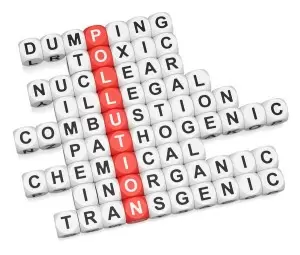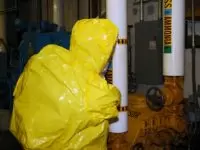
Forensic science is the application of science to legal cases. Forensic science technicians help investigate crimes by collecting and analyzing physical evidence. Environmental forensic science applies scientific methods to the investigation of environmental crimes and contamination events.
Forensic scientists use their skill and knowledge of chemistry and geology to study contamination events and determine their origins. They may collect samples on-site, analyze the samples in the laboratory, and assess the geology of a particular site to determine how chemical contaminants may have migrated through the environment. They may testify in court about their findings.
What Does a Forensic Scientist Do?
While there are different types of forensic scientists, most of them perform many of the same duties, like using chemical methods to test evidence taken from crime scenes in the laboratory. They must be detail-oriented, keeping records and writing reports on their techniques and findings. Some may collect samples from the scene themselves, cataloging the evidence and following established procedures to store and preserve it correctly. Environmental forensic scientists may also examine the geology and hydrology (water features and flow) of contaminated sites and surrounding areas to determine how pollutants have traveled through them, and where they came from.
While this career is science-based, communication skills are also very important. Forensic scientists must write reports of their findings and be able to explain their reports to lawyers. They may also be called upon in court to explain the investigative process in detail, including which samples were tested, how they were tested, the reliability of those tests, what the results were, and why they're relevant.
Environmental forensic scientists are valuable professionals who help protect public health and the environment. Unfortunately, the environment is subject to the "tragedy of the commons", and contamination is often seen as "collateral damage" - the price paid for civilization. Forensic scientists help ensure that those who contaminate the environment illegally are discovered and brought to justice. They may also save taxpayers cleanup dollars by identifying who should be legally responsible for cleanup costs.
Where Does a Forensic Scientist Work?
Most forensic scientists work in federal, state, and local governments. Environmental forensic scientists may have to work outside when collecting samples in the field or assessing the geology of a contaminated site. Travel to sites under investigation may be required. Forensic scientists also spend much of their time in laboratories. They may need to wear safety equipment when working in the field or in laboratories to avoid exposure to environmental toxins. They usually work a standard work week, though regular forensic scientists who work on violent crimes for local police departments may work longer hours or be "on call".
What Is the Average Forensic Scientist Salary?
The median annual wage for forensic science technicians overall was $60,590 as of May 2020.*
Environmental Forensic Science Jobs
Forensic scientists gather information and evidence about a specific set of past events and then use this data in a judicial court to determine innocence or guilt under the law. Forensic scientists are often employed by the criminal branch of the legal system in order to ensure that their ethics on a case are above reproach. While jobs do vary between financial forensics, IT forensics, and crime scene forensics, the tasks listed below are common to all roles:
- Record accurate physical and chronological measurements
- Observe, diagram, photograph, screen capture, and record evidence with the intent of preserving it in its raw and untampered state
- Apply the scientific method to the situation at hand, regardless of biased influences
- Design experiments to generate and test hypotheses
- Collect and secure evidence in a professional manner
- Have a deep understanding of the degradation of evidence due to time and tampering
- Have a broad knowledge of all peripheral sciences like chemistry, toxicology, serology, physical science, anatomy, dental science, and others as they apply to the current situation
- Analyze and present data in courts of law and discoveries
- Create infographs and reports for data presentation
- Understand how to effectively and accurately use statistics for communication and testing
- Use standard and proprietary computer programs and hardware with proficiency
- Test, analyze, and report on samples
- Be a strong communicator. Skills must include writing reports, offering verbal and written testimony, and making presentations
- Review leading edge research and literature
- Translate complex scientific evidence for specific audiences
Senior Forensic Scientists often have expanded job responsibilities that focus on management and leadership tasks. These responsibilities often include:
- Consulting with policy- and law-makers regarding best practices in a situation that requires forensic analysis
- Providing consultation to external stakeholders, professionals, and researchers
- Engaging in the design and development of new data collection techniques
- Developing or testing software that supports data entry and subsequent modelling for analysis
- Planning, organizing, and participating in workgroup meetings
- Mentoring junior members of the team
What Is the Job Demand for Forensic Scientists?
Employment of all types of forensic science technicians is projected to grow 16 percent between 2020 and 2030, which is much faster than the average growth rate for all occupations.* Growth will depend on the area of application. Increased interest in the environment may drive growth in environmental forensic science. Still, since it's a small field to begin with, the number of new jobs will be limited.
How Do I Get a Forensic Science Degree?
Forensic science technicians generally need at least a bachelor's degree in a natural science such as chemistry or biology, where they also study math. Aspiring environmental forensic scientists generally study geology, geochemistry, or chemistry, and develop a solid background in chemical reactions and transport in the environment. Many forensic scientists also have a master's degree in forensic science.
On-the-job training may be required for those who investigate crime scenes and work in labs. Forensic scientists may need to pass an exam before they can work on cases independently or testify in court. They must also participate in professional development to keep up with scientific and technological advances in the field.
Various optional licenses and certifications are available to enhance the credentials of forensic scientists. They may vary by jurisdiction.
Degrees Related to Forensic Science
What Kind of Societies and Professional Organizations Do Forensic Scientists Have?
- The International Society of Environmental Forensics (ISEF) is a professional association offering technical workshops and seminars on analytical chemistry and other related topics. It also publishes a journal presenting case studies and technological developments on sources of contamination, environmental fate and transport, and legal ramifications.
- The American Academy of Forensic Sciences (AAFS) is the foremost professional association for forensic scientists of all stripes in the United States. AAFS organizes meetings and hosts a range of resources including a reference library, videos, and webinars.
*2020 US Bureau of Labor Statistics salary figures and job growth projections for forensic science technicians reflect national data not school-specific information. Conditions in your area may vary. Data accessed September 2021.





